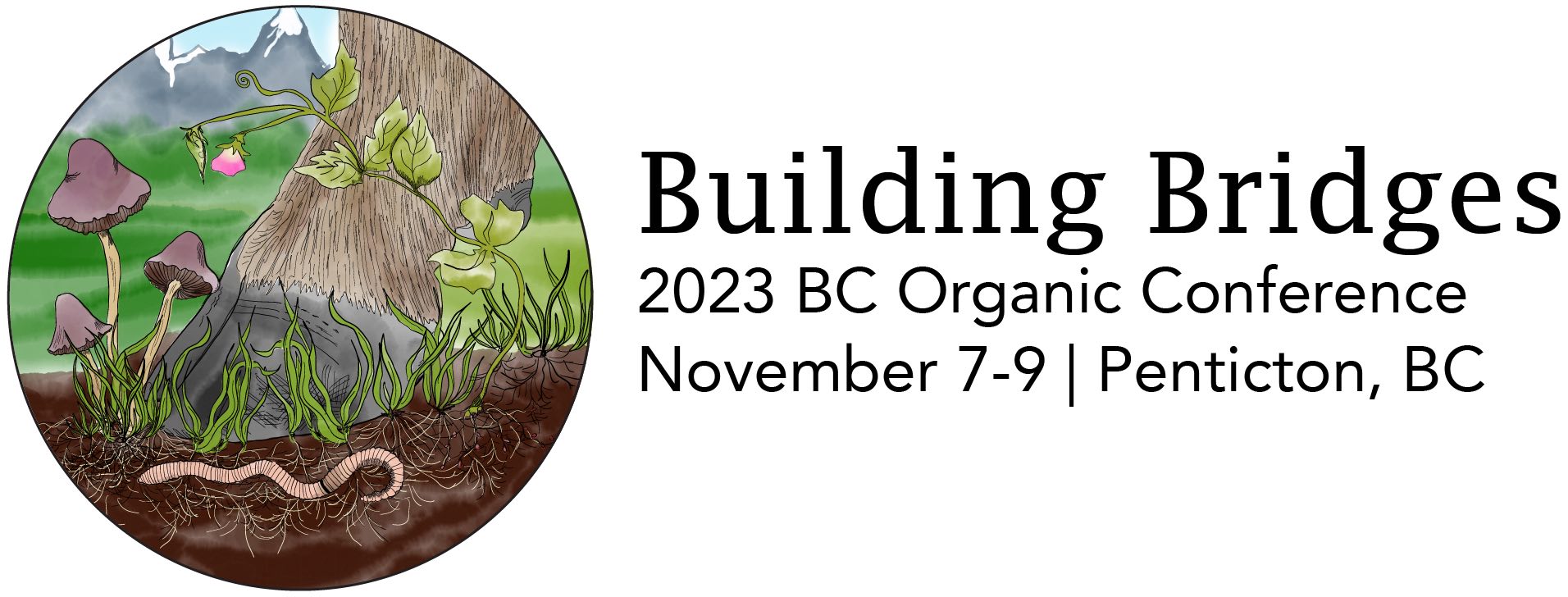
Year-Round Vegetable Production in Cold Climates
Catherine Sylvestre
Ferme des Quatre-Temps in Hemmingford (Quebec) has been working to develop production methods to grow and sell vegetables 52 weeks per year in a northern climate. They can now say they achieved this goal in 2023!
The aim of this workshop is to share the results of their trials, and to teach the basics to get started with year-around production of diversified vegetables. Participants will leave with concrete practical information and technical guides to get started.
Topics discussed will include:
- 5 key principles to winter growing
- Adapting to light availability
- Crop planning for continuous harvest
- Cold hardy crops
- Cold climate production techniques (disease, pests, irrigation, weeding, heating, etc.)
- New development in year-around farming and research projects
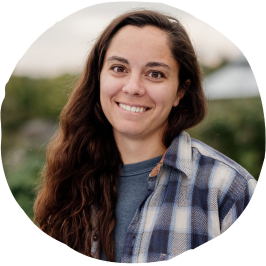
BIO:
Catherine Sylvestre is a professional agronomist and leader of the market garden team at la Ferme des Quatre-Temps in Hemmingford, Quebec. She develops, implements, and teaches best practices for cold season growing, specializing in crop protection and greenhouse production for northern climates. She is also the co-author of the book, “The Winter Market Gardener.”
Soil Food Web
Elaine Ingham
In this 1 hour session, world renowned soil microbiologist Dr. Elaine Ingham will explain the overarching principles of the Soil Foodweb approach, as well as the myriad benefits that can be gained by making soil biology work for you. The concepts that will be discussed are applicable to farmers, horticulturalists and backyard gardeners alike and will be accompanied by case studies that highlight the increased crop yields, fiscal savings and soil health that people who farm with biology have seen.
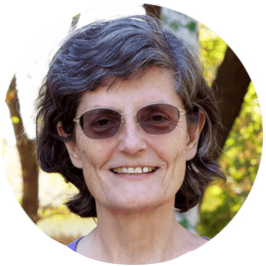
BIO:
Dr. Ingham uncovered the Soil Food Web nearly 4 decades ago and has been pioneering research about Soil Food Web ever since. Widely recognized as the world’s foremost soil biologist, she’s passionate about empowering people to bring the soils in their communities back to life.
Dr. Elaine’s™ Soil Food Web Approach has been used to successfully restore the ecological functions of soils on more than five million acres of farmland all over the world. The courses offered by Dr. Elaine’s™ Soil Food Web School have been designed for people with, or without, a science background – making them accessible to individuals who wish to learn and to begin a meaningful and impactful career in an area that will help to secure the survival of humans and other species.
Your Irrigation System and Climate Change
Bruce Naka
With our present climate changes including heat domes and droughts, it is imperative for our irrigation systems to be able to deliver water as effectively as possible. Is your system capable? Join Bruce in his discussion of what is necessary for an irrigation system to operate at its optimum and how to schedule and monitor its performance. Discover some new technologies and techniques to improve your irrigation skills.
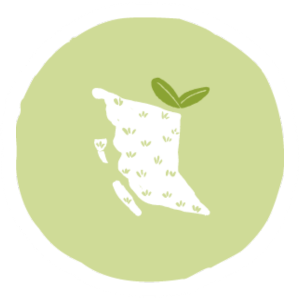
BIO:
Bruce has been involved in irrigation design and implementation for over 30 years. His experience covers all facets of irrigation systems from sports fields and golf courses to large-scale agricultural systems. Bruce is certified by the Irrigation Industry Association of BC (IABC) in Commercial Turf Sprinkler & Agriculture Sprinkler and Drip Irrigation, and he is also a certified Irrigation Scheduler. Bruce was also on the North Okanagan Drought Response Committee. Following this commitment, Bruce continued on to become a member of the North Okanagan Agricultural Advisory Board. In 2016, Bruce became a member of the Okanagan Water Stewardship Council (OWSC) representing the IABC, where he became co-chairman of a sub-committee on Irrigation Management. Bruce also served as president of the IIABC for the 2017-18 term. Since 2015 Bruce established an irrigation consulting company, Sound Water Advice, focused on efficiency in irrigation design & system planning.
Climate Resilient Livestock Production & Emergency Management
Julia Smith, Steve Meggait, Tristan Banwell, Reg Steward
The best time to prepare for challenging weather is BEFORE you find yourself and your livestock in an emergency. In this session, Julia Smith, Tristan Banwell and Steve Meggait will discuss livestock management techniques and systems you can implement during heat, wildfires, drought, cold and other extreme weather events as well as the role of strong, diverse genetics in building climate resilience. Reg Steward of AgSafe BC will touch on emergency preparedness and managing agricultural operations in the midst of an emergency.
BIOS:
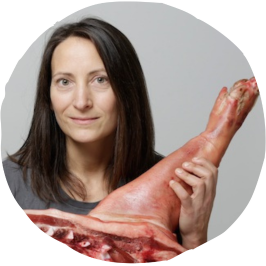
Julia Smith
Julia has been raising a wide range of livestock and working in the meat industry for the past 12 years. She lives completely off-grid and is currently working to preserve critically endangered Red Wattle hogs at Blue Sky Ranch in Nlaka’pamux Territory near Merritt, BC. She is a founding member and Executive Director of the Small-Scale Meat Producers Association where she is helping to build greater stability and growth opportunities for small-scale meat producers in British Columbia. She is a grazing mentor with Farmers for Climate Solutions’ Farm Resilience Mentorship program and is on the board of directors of Farmers for Climate Solutions.
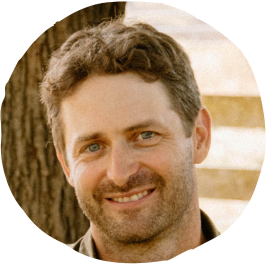
Steve Meggait
Steve is a 4th generation farmer in Armstrong, BC. He’s the owner of Fresh Valley Farms, a family run farming and direct marketing business that produces pasture raised beef, pork and chicken. Steve manages over 300 acres of crop lands and mountainside pasture where he produces pork, beef, eggs and broiler chickens in an outdoor pasture system. He has a Provincially Inspected chicken abattoir and Farmgate Plus licence to process pork, and is passionate about working to increase meat processing capacity in his community through the Spallumcheen Butcher Hub Network. Steve is a founding member and vice-president of the Small-Scale Meat Producers Association and a grazing mentor with Farmers for Climate Solutions’ Farm Resilience Mentorship program.
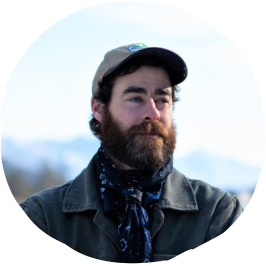
Tristan Banwell
Tristan manages Spray Creek Ranch, a regenerative, organic, diversified in the Northern St’at’imc Territory near Lillooet, BC. Together with his wife Aubyn and their team, he rotates cattle, sheep, pigs and poultry across irrigated pastures and rugged rangelands along the mighty Fraser River in a resilient agroecological system. He has a Farmgate Plus poultry abattoir and is also developing Maverick Meats, which will be an on-farm Provincially Inspected abattoir, to shorten his supply chain and serve other producers as they build their own direct marketing enterprises. Tristan is a founding member and president of the Small-Scale Meat Producers Association and a grazing mentor with Farmers for Climate Solutions’ Farm Resilience Mentorship program. From rotational grazing webinars to hands-on fencing training, virtual field days to on-farm events, Tristan has a gift for sharing his expertise in a relatable way.
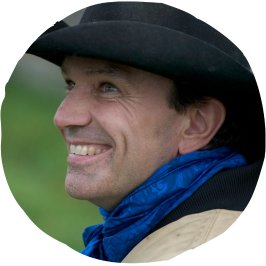
Reg Steward
Reg Steward is the BC Ranch Safety Specialist, Chilcotin Regional Safety Consultant for AgSafe BC. He has been providing agricultural safety consulting and articles for over 20 years throughout Canada and the USA. He is an RCMP veteran, recipient of the Canadian Medal of Bravery and numerous commendations and community service awards, most notably an inducted member of the BC Cowboy Hall of Fame.
Restoring and Retaining Soil Health with the Power of Compost
Jo Tobias
This workshop will outline the fascinating world of soil microorganisms and their critical roles in plant development. You will learn how to farm these wonderful microbes and maximize their potential via the preparation of potent extracts and teas. You will also learn from other farmers who have teamed up with microbes and hear about their forays into soil regeneration.

BIO:
Jo Tobias is a Regenerative Soils & Living Compost Specialist with the primary goal of assisting land stewards in understanding how they can play a role in soil health. Jo founded RootShoot Soils in 2015 and has collaborated with British Columbia, Alberta, Saskatchewan, and Ontario farmers. Her direct tool for regenerating degraded landscapes is a biodiverse compost. Compost can provide the foundation to kickstart microbial processes that stimulate nutrient cycling and decomposition when managed correctly.
Composting is Jo’s craft—she meticulously tends the whole process to create the ideal habitat for diverse microorganisms promoting plant health. Over the years, she has taught farmers practical strategies to leverage their compost to restore soil life. Jo also combines the power of microscopy with her restoration efforts to ensure she is on the right path to improving soil health. To learn more about Jo and her company, RootShoot Soils, visit www.rootshootsoils.com.
Farm Scale Adaptations to Climate Change Using On-Farm Trials
Dr Catherine Tarasoff
On farm trials do not have to be difficult; in fact, many simple projects have led to significant results for producers. In this presentation, Catherine will present producer-led trials, including the project ‘backstory’ and how a modification to their farming practice has made them more resilient to the impacts of climate change.

Catherine graduated from Oregon State University in 2007, earning a PhD in Crop Sciences with a minor in Rangeland Ecology. Dr. Tarasoff went on to a faculty position at Michigan Technological University. She now runs her own consulting company, Agrowest Consulting Scientists, is adjunct faculty and a sessional instructor at TRU. Catherine has been a Professional Agrologist for 25 years. As a believer in the need for practical, applicable and relevant applied research, has been working with multiple groups to ignite producer led on-farm trials. She wrote the manual “A Guide to On-Farm Demonstration Research” and has worked with a variety of agencies to put the tools of simple trial design into the hands of the producers.
Defining Regenerative Agriculture for Quality of Life
Percy Folkard
Agriculture has witnessed trends come and go with regenerative being the latest buzzword. Farmers and ranchers are debating meaningful definitions and practices, so we will take a closer look at old and new applications and explore regenerative concepts as they are applied to growing food. How does society, energy and technology support a regenerative food system? Here we attempt to qualify theories put into practice as agriculture redefines itself to become more regenerative.
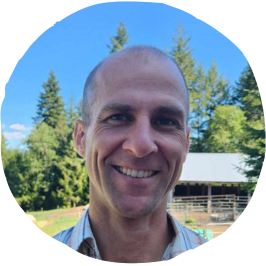
BIO:
Percy Folkard is an agricultural consultant and teacher while raising pastured beef, pork and chicken in the Shuswap region. Percy attained a Masters Degree from Thompson Rivers University studying agroforestry while formerly working in rangeland ecology research and policy with the BC Ministry of Forests and BC Ministry of Agriculture. As a food system advocate in a number of professional networks, he is passionate about sustainable agriculture and disseminating knowledge to build resilience in the face of change. Percy is of European ancestry and is a settler ally grateful to reside in unceded Secwepemculecw.
Small-Scale No-Till Farming
Alys Ford, Ravine Creek Farm
Alys Ford and Eric Struxness of Ravine Creek Organic Farm have been operating their mixed vegetable farm in the Slocan Valley for 13 years. In 2019 they transitioned to a no-till system of field management in around 75% of their operation. In this presentation, Alys will give an overview of no-till practices using their farm as an example, as well as highlighting examples from around North America of operations from 2-50 acres. She will cover aspects of mulching choices, weed control, nutrient amending, bed flipping and relay planting and provide a curated list of no-till support resources including books, web resources and farms, ending with facilitated farmer to farmer conversations around the no-till experiences.
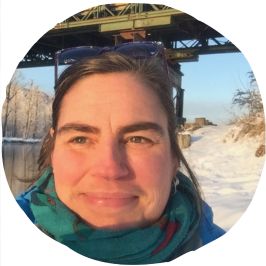
BIO:
Alys runs Ravine Creek Farm with her partner and children, she has been farming since 2010. In recent years as the impacts and urgency of the climate crisis have increased, Alys has sought new ways of mitigating the effects of climate change on her own farm. This has necessitated adaptations for both the farmers and the farm. Just as the farm has shifted to ever more regenerative practices (after several years of trials, the entire production area was transitioned to no-till in 2021) Alys has sought education and training to better understand how we can protect and recover from the stress that is inevitable in farming and is made significantly more intense by climate change. Alys is excited to share what she has learned about no-till and burnout prevention in the hopes of providing ecological lift to both farms and farmers. Alys is a settler of mixed European ancestry and has lived and worked for the past 20 years in Sinixt, Ktunaxa and Syilx territory.
Keeping Going – Evidence Based Practices for Farmer Burnout Prevention & Recovery
Alys Ford
In this highly interactive session, Alys Ford of Ravine Creek Organic Farm delves into some techniques to equip farmers with tools to manage the stress they face throughout a busy season. Introducing the work of 3 researchers of stress and trauma recovery and protection, Alys teaches participants techniques such as narrative resonance storytelling, the use of movement to support the completion of the stress response cycle, meaning making for emotional resilience and how to support your ‘body budget’ – the metabolic effects of stress. She will also provide a space for facilitated dialogue, allowing participants to share what techniques & practices are working or not working for them in their own work.

BIO:
Alys runs Ravine Creek Farm with her partner and children and has been farming since 2010. In recent years, as the impacts and urgency of the climate crisis have increased, Alys has sought new ways of mitigating the effects of climate change on her own farm. This has necessitated adaptations for both the farmers and the farm. Just as the farm has shifted to ever more regenerative practices (after several years of trials, the entire production area was transitioned to no-till in 2021), Alys has sought education and training to better understand how we can protect and recover from the stress that is inevitable in farming and is made significantly more intense by climate change. Alys is excited to share what she has learned about no-till and burnout prevention in the hopes of providing ecological lift to both farms and farmers. Alys is a settler of mixed European ancestry and has lived and worked for the past 20 years in Sinixt, Ktunaxa and Syilx territory.
Organics Around the World – Profiling Ethiopia, Cuba/El Salvador, Myanmar, Timor-Leste
Chuck Mitchell
Small holder farmers produce 80% of the total world food supply on 25% of the farmland. This presentation will highlight organic farming with small-holder farmers in four countries around the world. As organic farming is increasing at a rapid rate in developing countries, Chuck will share why.
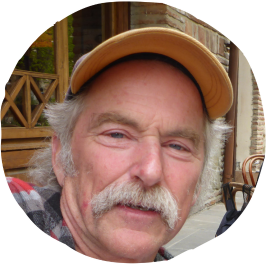
BIO:
Chuck Mitchell splits his time between Penticton, BC where he is an organic farm inspector and his organic teaching farm in the Philippines. He is a retired soil conservationist from the US Department of Agriculture and has worked for 45 years in developing nations.
Understanding the Principles of Integrated Pest Management
Molly Thurston and Renee Prasad
Molly and Renee will present a hands-on, interactive workshop delivered by two IPM Extension Specialists, presenting technical information and practical IPM applications that growers can implement on their farms. There will be in-class specimens for identification and demonstration with microscopes & hand lenses set up for participants to examine specimens.
BIOS:

Renee Priya Prasad, Ph.D is an Associate Professor in the Agriculture Technology Department at UFV. She received her Ph.D. from Washington State University and her Master of Pest Management from SFU (Simon Fraser University). She works closely with local consultants, BC Ministry of Agriculture, and Agriculture Canada experts and various grower groups. Renee teaches many agricultural courses at UFV and has also been a faculty advisor for directed studies projects. Renee’s favourite part of teaching in the Agriculture Technology certificate and diploma programs is that she gets to help the next generation of farmers be future-ready, by focusing on evidence-based practices in all her courses. She is also Department Chair.

Scaling up Seed Production, Variety Trials and Participatory Breeding Projects
David Catzel
If you are a farmer who grows seeds or is interested in incorporating or expanding seed production on your farmscape, then this workshop is for you. Learn what it takes to scale up seed production including available resources, how variety trials are a useful tool for new variety development, and opportunities to work collaboratively on breeding and varietal improvement projects. Come with your breeding project ideas as we hope to end the workshop with a networking session for those interested in collaborating.
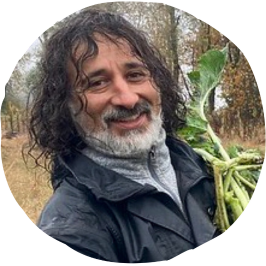
BIO:
David Catzel farmed vegetables, fruits and seeds for 20 years prior to taking on the role of the BC Seed Security Program Manager for FarmFolk CityFolk. He has delivered workshops on gardening, composting, and permaculture design to adults and children throughout the lower mainland and has a special passion for sharing seed stewardship knowledge with people of all ages.
Advice From an Old Agrarian
Doug Saba, Curly Willow Farm
Doug Saba of Curly Willow Farm in Grindrod, BC has a love of storytelling. He has been farming for over 30 years on his organic, mixed vegetable operation and has a desire to share his stories and wealth of knowledge with others in the farming community. Doug will lead a lively and informal discussion on his experiences, touching on pricing strategies, decision making around what crops to grow, and the importance of strong relationships, especially with other farmers. Ample time will be given to open farmer discussion and questions.
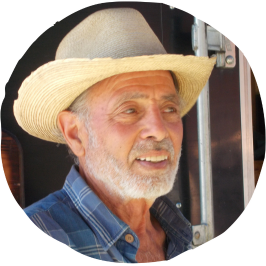
BIO:
Doug was raised in the city and apprenticed to become a cowboy/ranch hand when he was a teenager. In his early twenties he got caught up in the counterculture movement of the seventies. He then decided he would like to try going back to the land using horse power. He pursued that through the 1970s and 80s, living remotely trying to make a living via subsistence farming. In 1990 he moved back down to Armstrong where he had the opportunity to start market gardening in earnest and has been doing so for 30 years, eventually transitioning to tractor power.
A New Look at Cover Crops
Paddy Doherty
Paddy Doherty is a longtime vegetable farmer and organic advocate. In this highly interactive session, Paddy will draw on producer knowledge, facilitating a farmer-led discussion on participants’ experiences with different cover crops, discussing their pros and cons as well as talking about the connection between cover crops, climate change and carbon storage, introducing some thought provoking new research on cover crops in regards to their ability to draw down carbon and the ways in which they do so; microbes may make up more of soil carbon than we think and reducing tillage may not be the magic bullet in increasing soil carbon.
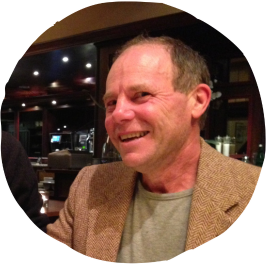
BIO:
Paddy grew up in Vancouver but moved ‘back-to-the-land’ in the 1970s. He has been an organic farmer all his adult life, from operating a sheep ranch in the Cariboo to a commercial carrot farm in the North Okanagan. Throughout his farming career, Paddy has held many posts within the local and wider farming community. His most recent position was Code Development Manager with ISEAL, based in London UK. Paddy and Elaine now own and operate West Enderby Farm in the North Okanagan, growing cauliflower and winter storage crops.
Be Rate Ready: Rising Interest and Inflation Rates and Your Farm Operation
Danny Turner
The combination of rising interest rates and high inflation affects every business, including farms. Business owners must understand how these external forces impact their balance sheets and income statements. In this session, participants will learn:
- The connection between rising interest rates and inflation
- Where you can find the effect of these two factors in your supply chain
- Why inflation and higher interest rates will change your financial statements
- How you can model the impact on your cash flow and predict the future of your business
This workshop is designed for business owners who want to understand how their business will change because of this new fiscal reality. Come prepared to read a few financial statements and do a little math!
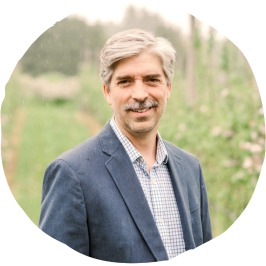
BIO:
Danny Turner is a business consultant with over 30 years of experience, as well as an organic farmer. He has been involved in the growth and management of businesses in Canada, the United States and Europe. Partnering with Kootenay Peaks Advisors and as an Executive-In-Residence for the Basin RevUP Program, Danny employs an always-learning philosophy as he assists companies at all stages of growth. When not on a Zoom meeting, you can find Danny running his family farm in Creston or volunteering on multiple boards.
Using Your Data to Make Financial Decisions
Danny Turner
Sometimes intuition and guesswork don’t make the grade in times that are fast changing and beyond our control. Using your own financial data to help make decisions is achievable. When should you pursue that new market or hire that new employee? Is it time to look for an investor or make that big capital purchase? Data-driven decision making is a foundational part of successfully running your business.

BIO:
Danny Turner is a business consultant with over 30 years of experience, as well as an organic farmer. He has been involved in the growth and management of businesses in Canada, the United States and Europe. Partnering with Kootenay Peaks Advisors and as an Executive-In-Residence for the Basin RevUP Program, Danny employs an always-learning philosophy as he assists companies at all stages of growth. When not on a Zoom meeting, you can find Danny running his family farm in Creston or volunteering on multiple boards.
Farmgate Licenses: A Path to Growth for Small-Scale Meat Producers
Julia Smith, Steve Meggait, Tristan Banwell
New meat inspection regulation greatly expanded opportunities for on-farm slaughter in October 2021. We’ll lay out the facts, dive into lessons learned, bust some myths, talk about insurance, discuss the business and economics of Farmgate facilities and look at some exciting examples of how this opportunity is being used to help meat producers and processors scale their businesses.
BIOS:

Julia Smith
Julia has been raising a wide range of livestock and working in the meat industry for the past 12 years. She lives completely off-grid and is currently working to preserve critically endangered Red Wattle hogs at Blue Sky Ranch in Nlaka’pamux Territory near Merritt, BC. She is a founding member and Executive Director of the Small-Scale Meat Producers Association where she is helping to build greater stability and growth opportunities for small-scale meat producers in British Columbia. She is a grazing mentor with Farmers for Climate Solutions’ Farm Resilience Mentorship program and is on the board of directors of Farmers for Climate Solutions.

Steve Meggait
Steve is a 4th generation farmer in Armstrong, BC. He’s the owner of Fresh Valley Farms, a family run farming and direct marketing business that produces pasture raised beef, pork and chicken. Steve manages over 300 acres of crop lands and mountainside pasture where he produces pork, beef, eggs and broiler chickens in an outdoor pasture system. He has a Provincially Inspected chicken abattoir and Farmgate Plus licence to process pork, and is passionate about working to increase meat processing capacity in his community through the Spallumcheen Butcher Hub Network. Steve is a founding member and vice-president of the Small-Scale Meat Producers Association and a grazing mentor with Farmers for Climate Solutions’ Farm Resilience Mentorship program.

Tristan Banwell
Tristan manages Spray Creek Ranch, a regenerative, organic, diversified in the Northern St’at’imc Territory near Lillooet, BC. Together with his wife Aubyn and their team, he rotates cattle, sheep, pigs and poultry across irrigated pastures and rugged rangelands along the mighty Fraser River in a resilient agroecological system. He has a Farmgate Plus poultry abattoir and is also developing Maverick Meats, which will be an on-farm Provincially Inspected abattoir, to shorten his supply chain and serve other producers as they build their own direct marketing enterprises. Tristan is a founding member and president of the Small-Scale Meat Producers Association and a grazing mentor with Farmers for Climate Solutions’ Farm Resilience Mentorship program. From rotational grazing webinars to hands-on fencing training, virtual field days to on-farm events, Tristan has a gift for sharing his expertise in a relatable way.
Pastured-Poultry Profits, Perils and Progress
Julia Smith, Steve Meggait, Tristan Banwell
Experienced poultry producers will benefit from this session where we will discuss best practices for maximizing profits and outcomes from your pasture-based poultry operation including nitrogen/nutrient management, timing your pasture moves, stocking rates, use of cover crops and integration of poultry into multi-species grazing models. We’ll also discuss new technologies and advances in equipment and infrastructure, HPAI best management practices, and work being done by the the Small-Scale Meat Producers Association to advocate for the growth of this sector.
Bridges and Synergies – Biodynamic Presentation and Panel
Ruth Tschannen, Gabe Cipes, Travis Forstbauer and Robby Gass
The Biodynamic Agricultural Society of BC will deliver a short film to introduce biodynamic farming principles, followed by a short presentation to show the synergy between biodynamic, organic and regenerative farming principles. This will be followed by a panel of four experienced biodynamic practitioners/farmers to answer and discuss questions and queries from the audience.
BIOS:

Ruth Tschannen
Ruth Tschannen is a passionate gardener who brings eurythmy, a modern art of movement, to the healing of the earth through biodynamics.

Gabe Cipes
Gabe Cipes has been the Farm Director, Permaculture Designer and Biodynamicist for Summerhill Pyramid Winery in Kelowna since 2010. Summerhill is the most awarded and visited winery in Western Canada..

Travis Forstbauer
Travis Forstbauer is a third generation biodynamic market gardener/farmer from a very well-known biodynamic family farm in Chilliwack with a longstanding history in establishing organic/biodynamic farming in BC.

Robby Gass
Robby Gass is a seasoned biodynamic/organic farmer, trainer, and consultant. He has an MSc in Organic Farming and is a certified Soil Food Web Microscopist with farming experience from South Africa, Europe and now Canada.
Viticulture Panel
Kurt Simcic (Head of Organic Viticulture, Sebastien Farms), Karnail Singh Sidhu (Owner, Kalala Organic Estate Winery), Gene Covert (Owner, Covert Farms Family Estate Winery), Lindsay Hainstock – Moderator (Extension Specialist – BC Ministry of Agriculture and Food)
Join these three wine-makers as they discuss current challenges, successes and techniques in the wine-making industry, covering topics such as water use efficiency, cover-cropping, disease and pest management, and dealing with extreme weather events—all in an organic context.
Bios: TBA
Farming in Community for Everyone
Cheyenne Sundance, Arzeena Hamir, Michelle Tsutsumi, Abra Brynne (Moderator)
In this workshop following a moderated discussion about farming at the intersection of multiple (often marginalized) identities, Cheyenne Sundance, Michelle Tsutsumi, Arzeena Hamir, and Abra Brynne will lead an interactive workshop in which we speak about direct ways to include a diversity of experiences in agriculture and how to broaden your farm community network in an intersectional way. Participants will have a chance to absorb and reflect on what they heard during the panel during a break before returning for an interactive discussion in the second portion of the workshop.
BIOS:
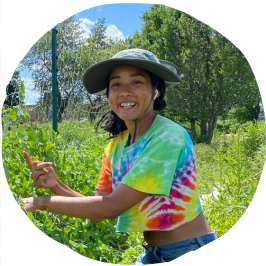
Cheyenne Sundance
Cheyenne Sundance is a greens and squash farmer who sells wholesale in Ontario. Cheyenne started Sundance Harvest, an ecological farm in southwestern Ontario, in 2019. With a strong interest in incubators, community land trust and cooperative farming, she co-founded Sundance Commons, a non-profit that provided the tools, long term land access, markets, guidance, and access for new farmers historically excluded from the agricultural sector. Sundance Commons provides all these resources at no cost to new farmers and aligns with the spirit of community land trusts. Aside from farming, Cheyenne likes puppet theatre and dancing at discotheques.
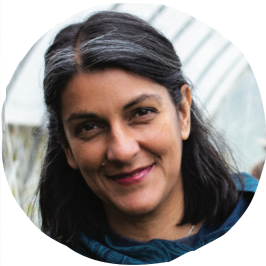
Arzeena Hamir
Arzeena Hamir earned her Bachelor’s degree in Crop Science from the University of Guelph and a Masters in Sustainable Agriculture from the University of London, England. She worked as a CUSO volunteer in Thailand and as a researcher in Jamaica, India, and Bangladesh. She was the staff Agrologist for West Coast Seeds from 1997-1999 and served as the Coordinator of the Richmond Food Security Society from 2008-2012, and in 2010 helped launch the Richmond Farm School. She and her husband moved their family to the Comox Valley in 2012 and run Amara Farm, a 25-acre certified organic farm in Courtenay, BC. In 2018, Arzeena was elected to the Board of the Comox Valley Regional District where she served as both Vice Chair and Director, Area B. She has also just submitted her papers to run as a Green Party candidate in the next Provincial election.
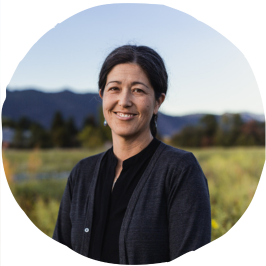
Michelle Tsutsumi
Michelle Tsutsumi started her organic farming and community building adventure in 2010 with Pilgrims’ Produce before moving to Golden Ears Farm in 2014. Michelle is passionately curious about organizational culture, shared leadership, and facilitating processes that support principled practice in service to equitable, inclusive, and anti-oppressive ways of being. Michelle has used this systems lens within the nonprofit, food justice, and co-operative business sectors for over 25 years and is keen to share Cultivating Safe Spaces and sociocracy facilitation with groups who are interested in meaningful, transformational systems change.
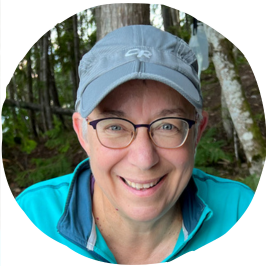
Abra Brynne
Abra Brynne has been deeply involved in farming and food systems her entire life, beginning with a childhood on a farm in Syilx Okanagan territory, where her family belonged to a local tree fruit marketing cooperative. She has worked closely with farmers and on food systems for thirty years, with a priority on value chains and the regulatory regimes that impede or support them. abra is FarmFolk CityFolk’s Policy Advisor on climate change and food systems. She is also currently pursuing a PhD focusing on settler roles in advancing Indigenous food sovereignty in Canada.
Navigating GAP and Other Food Safety Programs
Brody Irvine (Purchaser at Discovery Organics), Muhammad Arif (CFIA Operations Specialist for Western Area Operations Branch), Isabel Vary (Canada GAP Auditor and Technical Coordinator), Tim Wachter (Nature’s Fare Markets, Category Manager – Produce), Jordan Marr (Moderator)
Join this diverse group of people across the food supply chain to discuss where food safety certification currently stands. Gain an understanding of the different regulations and regulatory bodies involved, what is actually required to sell and where, resources available and some general myth busting. Hear from a farmers’, distributors’ and retailers’ point of view and discuss the potential for moves to make food safety certification more accessible in the future, particularly for the small to medium scale farmer.
Behind the Scenes of Organic Seed
Aaron Varadi and Chris Thoreau
Get a behind the scenes view into the organic seed world from the perspective of two seed professionals from both the regional and continental level. This session will cover topics like: variety origins and sourcing; different seed markets; collaboration with seed growers; and an extensive Q&A with audience members.
BIOS:
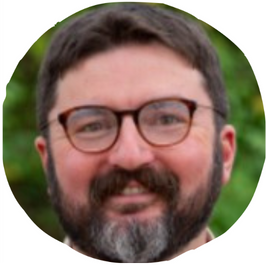
Aaron Varadi
Aaron joined High Mowing Organic Seeds in the summer of 2020 as a Commercial Grower Sales Representative, where he works with commercial vegetable growers across Canada and California to get them the seeds and knowledge they need to thrive.
Prior to joining High Mowing, Aaron spent the previous decade managing organic farms in western Washington state, first at his own operation, Sunbreak Farm, and then at the Organic Farm School, a farmer training program. At both farms he grew diversified vegetables, pastured livestock, and seed crops on contract for High Mowing and many other seed companies. He has participated in variety trials on a regional and national level, and has developed his own breeding projects as well as collaborating on breeding projects with industry and research partners. In addition to working with vegetable growers, Aaron also works as High Mowing’s Contract Production Specialist, where he helps coordinate contract seed productions with High Mowing’s dozens of growers, helps identify and orient new seed growers, and assists all contract growers with crop planning and technical assistance.
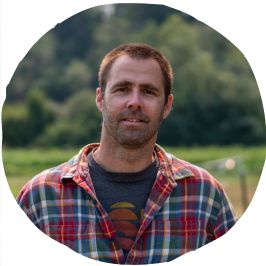
Chris Thoreau
Chris Thoreau is the Operations Manager for the BC Eco Seed Co-op and a long-time flower and vegetable seed grower. He is currently growing seed in South Burnaby with a focus on dye flowers. He has particular interests in seed conditioning, seed quality assurance, and seed policy. Chris holds a BSc. in Agroecology, a MSc. in Integrated Studies in and and Food Systems, and is a registered professional agrologist in BC.
Thank you to our session funders
Funding for “A New Look at Cover Crops” and “Pastured-Poultry Profits, Perils and Progress” are funded in part by Agriculture and Agri-Food Canada through the BC Climate Agri-Solutions Fund delivered by the Investment Agriculture Foundation of BC.

